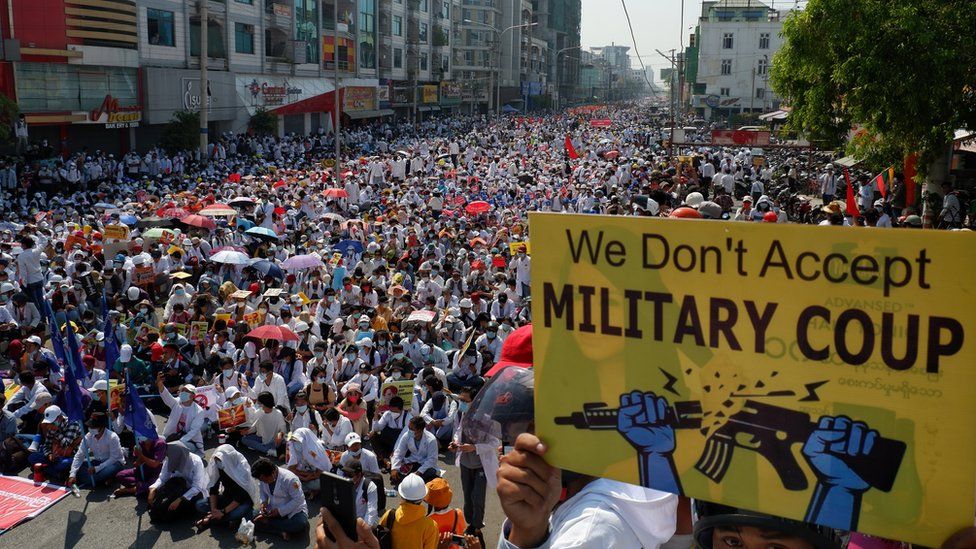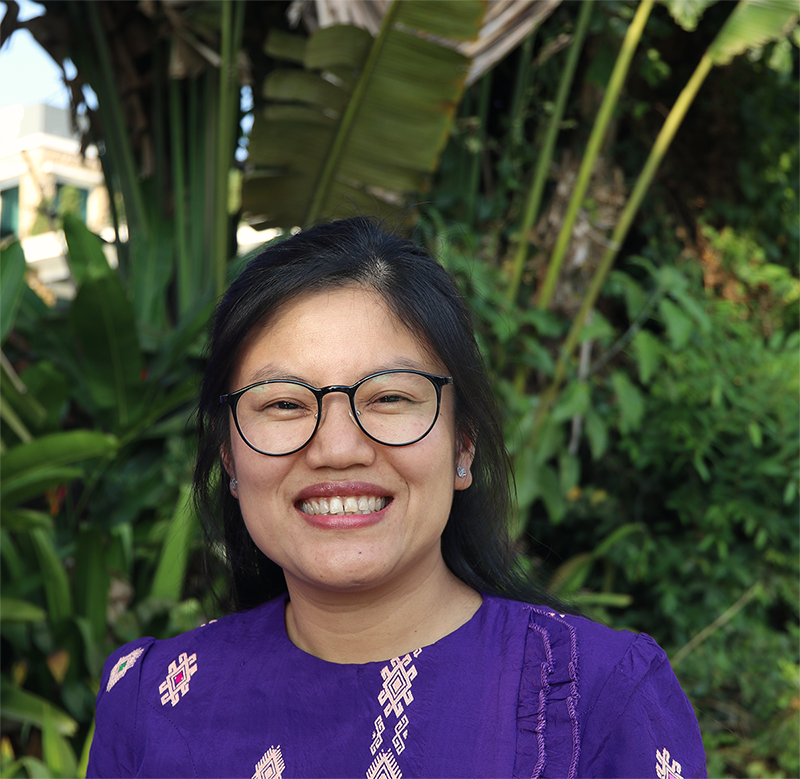Myanmar is in a humanitarian crisis. Now two years of political turmoil have forced over a million from their homes. Internally displaced persons and host communities alike have struggled to find basic services amid conflict. We spoke with alumna Yin Yin Min as she explained how her project builds social cohesion through integrated waste management.

Military leaders overthrew Aung San Suu Kyi’s elected government on 1 February 2021. Source: Getty images.
In February 2021, a military junta overthrew Myanmar’s government. The country has since then fallen into turmoil – public infrastructure and services have degraded to critical levels, and dissenting civil servants have been forced from the country or into hiding.
Political turmoil and economic downturn have resulted in increasingly complex and mixed population movements, with both regular and irregular migration occurring between Myanmar and neighbouring countries like India and Thailand. There are also 1.4 million internally displaced persons (IDPs) who have been forced from their original communities. In central states like Sagaing, where up to 624,000 people have been displaced, a humanitarian crisis has emerged.
Yin Yin Min is a Senior Project Coordinator at the Asian Institute of Technology (AIT). She works on the “K4DM – Knowledge for Democracy – Myanmar” project, through which she supports women by building a community of gender scholars to support civil society for a just, fair, and secure development in Myanmar. We sat down with Yin Yin Min to learn more about her work in western Myanmar and the project she has implemented since returning from The Hague Academy.
Migration Under Conflict
As Yin Yin Min explained, active conflict, disrupted livelihoods, and deteriorating economic and security conditions have uprooted thousands of people in her country. Nearly half of Myanmar’s population is now living below the poverty line and approximately 17.6 million are expected to be in need of humanitarian assistance. People are forced to move away from their homes to crowded camps, or often remote areas where they cannot sustain their livelihoods:
“Active conflict and clashes also continue in different locations, many families experience repeated, short-term displacement. [They] move often to hard-to-reach forest areas in order to avoid frequent military incursions”.
Since there is no immediate solution to control migration patterns under such a conflict situation, the International Organisation for Migration (IOM) and other organisations have begun to collaborate with local CSOs to support internally displaced persons and refugees through basic needs provisions. Long-term refugee camps aim to provide food, shelter, water, sanitation, mental health support, skills training and livelihood assistance. Local communities have also taken the responsibility of hosting families for short-term periods, providing food and necessary items while camps organise.
New Toolkit, Old Context
Yin Yin Min joined The Hague Academy’s Migration & Local Governance course to learn how other countries have tackled their migration issues, how civil society or local communities organise their resettlement programmes, and how other participants have implemented programmes on social cohesion and the local integration of IDPs and refugees with host communities.
“There are many key learning points that I have received from the course. Overall, I learned statistics, treaties of migration, and migration theory while enjoying particular sessions like social cohesion in specific contexts, and a gender perspective on entrepreneurship by understanding the specific experiences of female entrepreneurs”.
As she explains, IDPs and local communities throughout Myanmar face economic and security stresses that not only make it difficult to receive basic services but also lead to mistrust and low social cohesion among host and ‘guest’ communities. One way to improve social cohesion is to help them create joint sustainable practices that improve upon their well-being where outside authorities cannot.
Therefore, Yin Yin Min has begun to work with women civil society organisations in the Chin state of western Myanmar to support inclusive waste management services in local communities hosting refugees and displaced persons. By including marginalised groups and actively engaging the overall community in a joint goal, Yin Yin Min hopes that this initial project around waste management can lead to even further cooperation and integration. Plus, tackling waste management would solve a tremendous sanitation and health issue affecting these communities.
Back Home Action Plan
 Yin Yin Min outlined the project as follows:
Yin Yin Min outlined the project as follows:
“First, a virtual session was conducted with local women’s leaders from the group… with a specific focus on social cohesion as well as the approach of refugee entrepreneurship. In the same sharing session, I discussed with them how to identify local stakeholders by using analysis methods that I have learnt from the course – like the Eden and Ackermann framework for stakeholder analysis”.
It was challenging to create a comprehensive waste management plan in the current context, but the women’s group managed to draw up a plan to tackle the issue. Their actions points include: 1) training of young men and women already active in the community on better waste management; 2) creating community dialogues on joint solutions; 3) organising climate dialogues and ecofeminism talks with experts for long-term solutions; and 4) conducting local economic situation assessments to support entrepreneurship among local community members and IDPs alike.
In 10 Years…
In the context of state failure, civil society members like Yin Yin Min have stepped up to galvanise community members toward action, often taking sustainability and inclusivity to heart.
“Public services have been distorted since the coup and thus in most of the areas, local communities have to arrange by themselves”.
Yin Yin Min hopes for a people’s government to bring stability and begin implementing cohesive migration policies, among others. Importantly, policies that give rights to all in Myanmar, allowing all its people to participate freely and fully in society.
“I would like to see the value of having the importance of diversity and how those diverse communities can contribute to building a federal democracy in Myanmar. Hopefully, a democracy will prevail soon”.
Join our Migration & Local Authorities course!
Interested in innovative solutions to the complex challenges of displaced populations? Make sure to join our Migration & Local Authorities course.
Related courses
We offer a diversity of courses throughout the year. Here are several other courses you might like.

